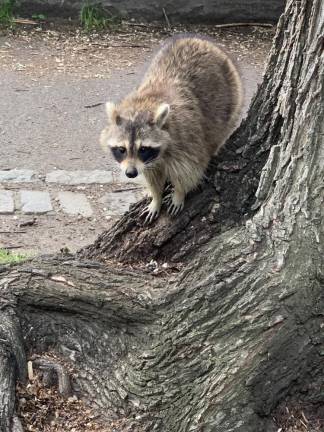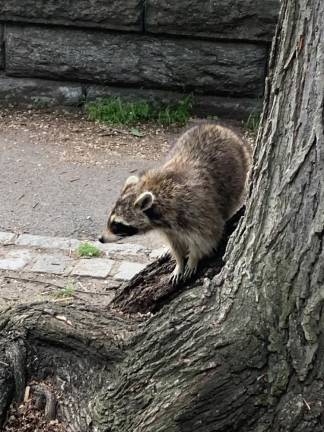As the human residents of Morningside Heights prepare for winter, locals say the neighborhood’s raccoon population is healthy and growing.
Directly adjacent to Columbia University’s campus sits a section of Riverside Park best known for its soccer fields, tennis courts and shady picnic spots. However, the area is also host to an increasingly large group of wild raccoons.
The raccoons sleep in burrows nestled in the middle of the stone wall which separates the upper level of Riverside Park from the lower. However, being a predominantly nocturnal species, they spend much of the evening and night prowling the upper level of the park in search of tasty treats.
“They search for food in the garbage cans and stuff. That’s their hobby,” says Geovany Freire, assistant superintendent for a building in Morningside Heights directly across from Riverside Park.
Raccoons have been observed living in Riverside Park for several years. A Time Magazine article from 2016 titled “There’s No Reason For This Giant Raccoon to Be Up in a Tree on a New York City Street But Here It Is,” features a short video of a particularly large raccoon perched in a tree off West 115th Street.
“They’re out there every day, especially in wintertime. Very visible. They’re always in packs ... They do stare you down,” says Freire.
Wildlife agents at Pest Animal New York City, a private animal control service, say they have not to their knowledge received a call about raccoons in Riverside Park. However, they have dealt with numerous raccoon issues on the Upper West Side in general.
“We get calls from the Upper West Side all the time. We will go out and get them,” said a licensed wildlife agent with Pest Animal. “We do charge for the service. If it’s just trapping, it’s 195 dollars to go out, set traps, pick them up. If they have kits, it’s more visits.” New York City Animal Control, on the other hand, will not catch or trap healthy raccoons. According to their website, they only get involved in potential cases of rabies.
As carriers of rabies, raccoons can pose a health concern to New Yorkers. The city’s Animal Control department website says that from September to October of this year, they implemented a program to vaccinate raccoons in Manhattan, Brooklyn, Queens and Staten Island against rabies.
New Yorkers who find the creatures cute rather than pesky will be pleased to know that wildlife agencies typically do not harm them, instead transferring them to greener pastures. “We examine them for diseases, temperament. [Then] we relocate them if the animal’s healthy,” explains the Pest Animal agent.
While it can be tempting to get closer to the creatures, Animal Control asks that New Yorkers not approach, feed or touch city wildlife. So next time you see a raccoon in Riverside Park, smile and wish him a good day — from a distance.

